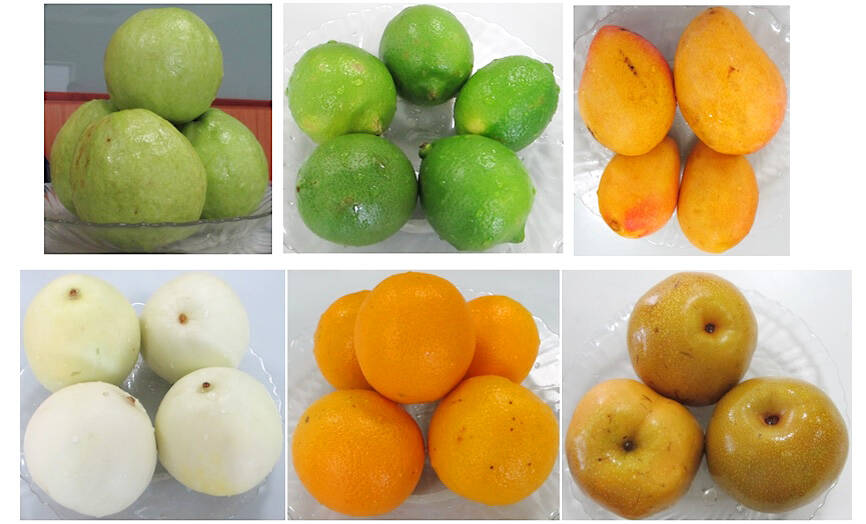An expert urged people to wash fruit thoroughly before consuming it, after a recent study by the National Health Research Institutes (NHRI) found species of yeast that were resistant to the fungicide fluconazole.
The NHRI said it researched 123 yeast isolates from 17 samples of six different kinds of fruit bought from a supermarket, and among them Candida tropicalis was the most frequently found species of yeast, including three variants that were resistant to fluconazole.
The three fluconazole-resistant C tropicalis variants belonged to the same predominant genotype of azole-resistant C tropicalis that causes candidemia, a common fungal bloodstream infection in hospitalized patients in Taiwan.

Photo courtesy of the institutes
The study suggests that the drug-resistant C tropicalis might already widely exist across the nation and can spread among the surface of fruits sold in supermarkets.
For long-term tracking of pathogenic yeast infections and the distribution and drug susceptibilities of Candida species, the NHRI’s National Institute of Infectious Diseases and Vaccinology deputy director Lo Hsiu-jung (羅秀容) in 1999 launched the Taiwan Surveillance of Antimicrobial Resistance of Yeasts (TSARY) program.
The study found that C tropicalis is one of the most common non-albicans Candida species, and it has a higher chance of being drug-resistant than other Candida species. In 2017, Lo published a study warning that C tropicalis could be found on fruit surfaces.
Since 1999, Lo’s research team has continued its surveillance of pathogenic yeast on fruit surfaces, and recently collected 17 samples of six types of fruit — pear, mango, lemon, melon, orange and guava — from a supermarket in northern Taiwan for testing, and a total of 123 yeast isolates were identified.
C tropicalis was found in 10 samples, accounting for about 60 percent, and three among them were resistant to fluconazole.
Lo said there are two possible main reasons that C tropicalis was found on fruit surfaces: the human factor, such as contamination from the hands of farmers, packaging workers, supermarket workers or customers after the fruit has been harvested; and environmental factors, such as contamination through water, soil or leaves during the growing stage.
She said the three fluconazole-resistant C tropicalis strains belong to the same predominant genotype of azole-resistant C tropicalis that causes candidemia in patients in Taiwan.
Drug-resistant C tropicalis in hospitals can be spread among patients, their family or medical personnel, and as there is no direct evidence of patient-to-patient transmission, fruit might be a transmission route of drug-resistant C tropicalis, Lo said.
Azoles are commonly used in agriculture as fungicides and also clinically as antifungal drugs to treat pathogenic fungi, she said, adding that the use of azole fungicides on fruit might have indirectly filtered azole-resistant pathogenic microbes, such as the C tropicalis, and it might spread from fruit to humans, so if the fungicide is used on vegetables or other crops, the same problem might occur.
Lo said people with healthy immune systems might not get sick from eating food with drug-resistant C tropicalis, but it might cause severe infection in immunocompromised individuals, so fruit should be washed thoroughly with clean water before being eaten to remove potential drug-resistant pathogenic microbes.

Aftershocks from a magnitude 6.2 earthquake that struck off Yilan County at 3:45pm yesterday could reach a magnitude of 5 to 5.5, the Central Weather Administration (CWA) said. Seismological Center technical officer Chiu Chun-ta (邱俊達) told a news conference that the epicenter of the temblor was more than 100km from Taiwan. Although predicted to measure between magnitude 5 and 5.5, the aftershocks would reach an intensity of 1 on Taiwan’s 7-tier scale, which gauges the actual effect of an earthquake, he said. The earthquake lasted longer in Taipei because the city is in a basin, he said. The quake’s epicenter was about 128.9km east-southeast

GENSLER SURVEY: ‘Economic infrastructure is not enough. A city needs to inspire pride, offer moments of joy and foster a sense of belonging,’ the company said Taipei was named the city with the “highest staying power” in the world by US-based design and architecture firm Gensler. The Taiwanese capital earned the top spot among 65 cities across six continents with 64 percent of Taipei respondents in a survey of 33,000 people saying they wanted to stay in the city. Rounding out the top five were Vietnam’s Ho Chi Minh City (61 percent), Singapore (59 percent), Sydney (58 percent) and Berlin (51 percent). Sixth to 10th place went to Monterrey, Mexico; Munich, Germany; Sao Paulo, Brazil; Vancouver; and Seoul. Cities in the US were ranked separately, with Minneapolis first at

The New Taipei City Government today warned about the often-overlooked dangers of playing in water, and recommended safe swimming destinations to cool off from the summer heat. The following locations in the city as safe and fun for those looking to enjoy the water: Chienshuiwan (淺水灣), Baishawan (白沙灣), Jhongjiao Bay (中角灣), Fulong Beach Resort (福隆海水浴場) and Sansia District’s (三峽) Dabao River (大豹溪), New Taipei City Tourism and Travel Department Director-General Yang Tsung-min (楊宗珉) said. Outdoor bodies of water have variables outside of human control, such as changing currents, differing elevations and environmental hazards, all of which can lead to accidents, Yang said. Sudden

Tropical Storm Podul has formed over waters north-northeast of Guam and is expected to approach the seas southeast of Taiwan next week, the Central Weather Administration (CWA) said today. The 11th Pacific storm of the year developed at 2am over waters about 2,660km east of Oluanpi (歐鑾鼻), Pingtung County — Taiwan's southernmost tip. It is projected to move westward and could have its most significant impact on Taiwan on Wednesday and Thursday next week, the CWA said. The agency did not rule out the possibility of issuing a sea warning at that time. According to the CWA's latest update, Podul is drifting west-northwest